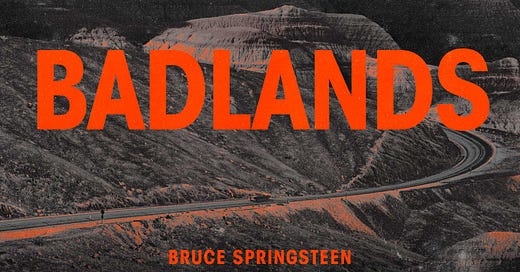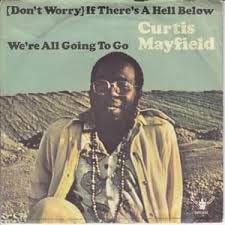It’s been a minute. I try to write when I have something to say—something under my skin. Today I do. Maybe it’s the times we live in.
Curtis
After the election last Tuesday, I turned off the news—the perfect time to disrupt my twenty years of news junkiedom. I focused on myself and the world around me. Preparing for our first child, due in December. The house upstate we had recently bought. An old wooden chest I had been repainting in eggshell blue, on a thicket of dark blue tarps piled on our front porch, because, per county inspection, it bore lead.
And I had music. I scanned my playlists and record collections for the right mood. Few tunes have felt more stingingly relevant these days than Curtis Mayfield’s (Don’t Worry) If There’s Hell Below, We’re All Gonna Go, that end-times funk barnstormer with Curtis as dark prophet reciting a litany of social ills—like Gaye’s What’s Going On, it relies on a list format to overwhelm your ears—as if to convey that there’s more going on these days than any brain can handle.
Post-2024 election, the song hit different. Or maybe, hit like it was always supposed to. Play the song over footage in your mind of election results, and the title seems say, we’re all gonna go to hell, because this world is all our fault. We are all guilty.
And that’s guilt, for you, in its deepest, most primal, bone-deep sense. Guilt lurks and finds you, even if you didn’t do anything wrong. Even if you voted Democrat. Even if you canvassed, volunteered, donated, marched, screamed at the top of your lungs at passersby, even then, this collective guilt for the fallen world we find ourselves in, that guilt stains you too. We have done this to ourselves, and every election produces the outcome we deserve.
If there’s hell below, we’re all gonna go.
I don’t mean that sentiment as a final judgment—I mean it as the precursor to moral and political commitment. That we are all guilty today means that we are all infinitely responsible for what happens tomorrow.
Bruce
A strangely warm fall, its uncanny comfort. Dry in the northeast, at record levels. Bright sun playing on the brilliant colors in the trees. Each morning last week I got up an hour early to paint the wooden chest, and music kept me going, in those strangely warm hours. Springsteen and manual labor are a natural pair. Darkness At the Edge of Town has been really landing since Tuesday. It’s a perfect album-as-movie, following Springsteen’s “four corners” approach. First song on side A is uptempo, last song on side A is a downer, first song on side B uptempo, last song on album a downer.
The night of the election, I sat at the piano and played Badlands, the album opener.
Chaos burns in the opening lines:
Lights out tonight, trouble in the heartland
Got a head-on collision smashin' in my guts, man
I'm caught in a crossfire that I don't understand
Then a clench-jawed optimism flickers to life in the chorus
Badlands
You gotta live it everyday
Let the broken hearts stand as the price you've gotta pay.
We'll keep pushin' till it's understood
And these Badlands start treating us good
Adolf
Rizz, the kids call it—a sped-up, chopped up remix of the word charisma—echoing how TikTok and other platforms relish sped up chipmunk music as the soundtrack to their hyperfast blasts of social media content. Today we think of charisma as the quality of individual charm, but the word entered popular vernacular shortly after WWII as a political science theme. Charisma was first put forth by Max Weber in his exploration of charismatic authority—how there were political leaders, usually outsiders, who didn’t rely on institutions or tradition to rouse their followers, they used their magnetism and heroic aura.
You don’t need a polisci degree to figure out why the aftermath of the war became prime time to understand the impact that charismatic authority can have on a nation.
Part and parcel with Weber’s concept is the role of new media technology in perpetuating the mythic narrative of the charismatic leader. In Germany during the thirties, it was radio—the newfangled devices popping up in middle class living rooms nationwide—the so-called Volksempfaenger, “People’s Receiver”, propagated by the Nazis as a propaganda tool.
New media tech has a timelag of literacy. If you’re not used to it, if you have no critical apparatus for appraising its form and function, the tech—whether it’s radio, movies, the internet, or social media—can grab you by the lapels and shake you to your core.
Sound Machine is about sound and music of course, but it’s also about the tech that delivers the audio experience. About where sound shows up and its impact in context. In Germany, it was Adolf’s voice, ghostly and commanding, booming from the radio. Today, well, you get the idea.






I couldn't bear to watch the election night coverage. I was fearful. I didn't watch a minute. I got the news in a text early the next morning from a friend in Colombia who knows my politics. Something like, "Sorry for the outcome..." That's how I found out.
I haven't watched *any* news since. Not a click. I am still stunned. Stunned both by the dread of the potential for our country, and by the stupidity of my fellow Americans. How could a majority be so stupid? The Long-Game (at least 40 years) the far-right has played with our public education system has really paid off.
Many around the world are happy for the possibility that America will finally go down. I think they actually may be right. I am not sure we will *ever* overcome this loss. There may be too much damage done in the next four years.
I have had the worst bout of insomnia of my life.